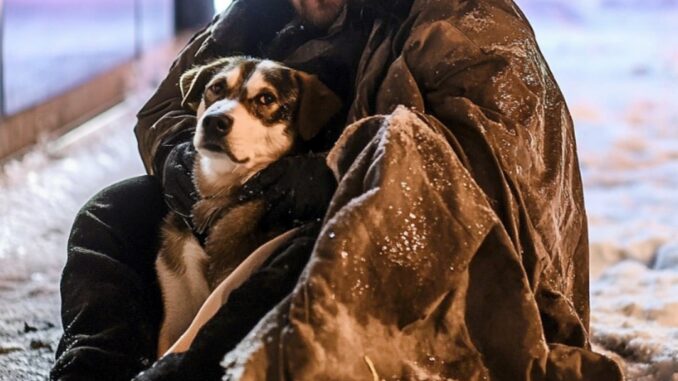
I was finishing a long shift at the downtown sporting goods store when I first saw him. I was exhausted from dealing with returns, faulty registers, and the news that my daughter, Amy, had failed another math test. Stepping outside into the biting cold, I tugged my coat tighter and headed for the bus stop, dreaming of a hot bath at home.
On my way, I passed a shawarma stand that had been around for as long as I’d worked at the mall. The delicious smell of roasting meat and spices filled the frosty air. Normally, I tried to avoid the vendor—his perpetual scowl put me off—but that evening something made me stop. A homeless man and his dog approached the stand, both looking frozen, tired, and painfully hungry.
“Are you going to order something or just stand there?” the vendor barked, eyeing the man suspiciously.
The man hunched his shoulders, his dog pressing close for warmth. “Any chance I could get some hot water, sir?” he asked softly.
“Absolutely not!” the vendor snapped. “I’m not running a charity.”
I saw the man’s expression collapse. In that moment, I heard my late grandmother’s voice in my head—she used to say that a single act of kindness could change someone’s life. Acting on impulse, I stepped forward.
“Two coffees and two shawarmas, please,” I said quickly.
The vendor grunted, threw the orders together, and demanded eighteen dollars. I paid, grabbed the food, and hurried after the man and his dog. His hands shook as I pressed the food into them.
“Thank you,” he whispered, voice trembling. “God bless you.”
I managed a quick smile and was about to move on when he fished a scrap of paper from his pocket, scribbled something on it, and pressed it into my hand. “Read it at home,” he said with a strange intensity.
That note stayed in my coat pocket until the next day, when I was cleaning out laundry and found it again. The message read: Thank you for saving my life. You don’t know this, but you saved it once before. Then there was a date from three years ago and the name “Lucy’s Café.”
My chest tightened. Lucy’s Café had been my favorite lunch spot before it closed, and I recalled a day—during a thunderstorm—when a soaking-wet man stumbled in, looking ready to give up on everything. No one paid him any attention, but I’d bought him a coffee and a croissant. At the time, I thought nothing of it. Could the man I’d helped in the café and the man with the dog be the same person?
I left work early and returned to the shawarma stand the very next afternoon. Sure enough, I spotted the man and his dog huddled in a nearby alcove. His face lit with surprise when he saw me.
“I read your note,” I said. “I can’t believe you remember me from Lucy’s.”
He exhaled a shaky breath and managed a worn smile. “You were a bright spot in a dark world,” he said. “I was at rock bottom when you offered me that coffee. It kept me going—enough that I found this dog, Lucky, and decided to stick around a bit longer.”
I introduced myself properly and asked if I could do more than just buy him the occasional meal. He looked at me warily. “Why?” he asked.
“Because everyone deserves a second chance. Let me help.”
His name was Victor. Over coffee at a nearby café, he shared his story: he was once a truck driver with a wife and young daughter. Then a catastrophic car accident left him badly injured and saddled with steep medical bills. He lost his job, his wife left, and depression drove him onto the streets. He’d been drifting ever since.
Hearing this, I realized simply handing him a sandwich now and then wouldn’t be enough. So I arranged for him to stay at a local shelter that accepted pets—Lucky included. My husband, Tom, worked at a law firm and put Victor in touch with a colleague who specialized in disability cases. My children helped me set up a small fundraiser to cover Victor’s basic needs, from warm clothes to vet checkups for Lucky.
Within a month, we’d secured a short-term rental for Victor, and a local warehouse gave him a job—where Lucky became the beloved morning-shift mascot. Finally, Victor was standing on his own two feet again.
Months later, on my birthday, our doorbell rang. I opened it to find Victor on my doorstep, dressed neatly and carrying a chocolate cake from a local bakery. Lucky wagged his tail excitedly, sporting a shiny new collar.
“You’ve saved my life three times,” Victor said, his voice thick with emotion. “At Lucy’s, by the shawarma stand, and through everything you’ve done to help me get back on my feet. Please accept this cake—though it’s nothing compared to what you’ve done for me.”
I struggled not to cry as I ushered him inside. My family, gathered for a small party, warmly welcomed Victor and Lucky. Over slices of sweet chocolate cake, we shared stories and laughter.
Sometimes I think about how close I came to ignoring him on that frigid evening, too caught up in my own routine. It still chills me to imagine walking by, unaware that one more small kindness might be what someone needs to keep going. My grandmother was right: compassion costs nothing, but it can change everything. And in a harsh world, one simple act can be a lifeline for someone desperately hoping not to be invisible.
Leave a Reply